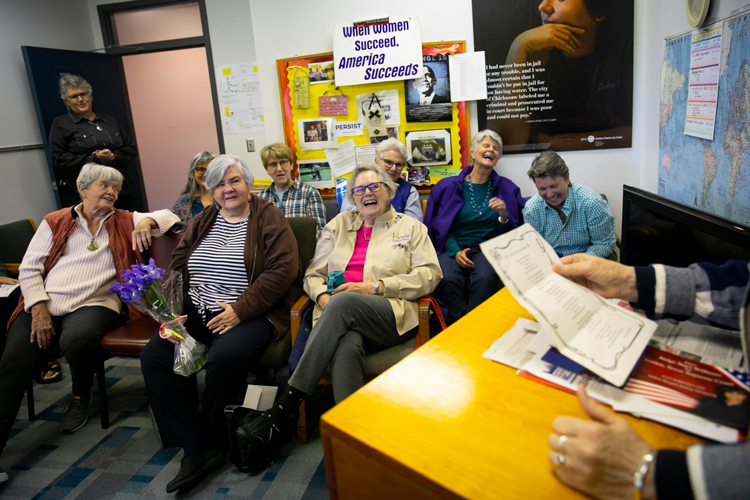
Defining Feminism, One Woman at a Time
The Houston Women’s Group found a way to harness the fury.
“We were furious in the ’70s,” Iris Greer Sizemore says.
The “we” she is referring to is women. That fury is the reason why, in September of 1975, Greer Sizemore and her then partner, Marguerite Oppinger, founded the Houston Women’s Group.
Greer Sizemore had moved to Houston from South Carolina in the late ’60s. “We were riding on the message of a great movement that was already in place,” she recalls. “I wanted to continue moving forward with that movement. What was unique about the Women’s Group was fury.”
When it comes to creating a new group, finding an affordable place to meet can be a huge challenge that can make or break a group. “The most important thing was the space, and it was given to us. So, we have incredibly deep gratitude for the First Unitarian Universalist Church.”
Other than a brief Zoom-only hiatus because of the pandemic, the group has been meeting there every Sunday since that fateful September gathering 47 years ago. They are now offering hybrid sessions, allowing women from all around the world to participate. And they do.
Each week, meetings feature a presenter and/or a general discussion about the lives of group members, as well as current events. Following the group’s planned meeting, attendees often head off to lunch together to continue their conversations.
One of the unique things about the group, Greer Sizemore says, is the absence of officers and business meetings. “You walk in, and you’re a member,” she says. “Each woman defines her own feminism.”
The group’s understanding of gender-identity issues has always been ahead of its time. “We had the first trans woman at our meetings in the ’80s. Trans was not an issue. We have a great deal of diversity. We have always been perceived as open to all women.”
“You walk in, and you’re a member,” says Iris Greer Sizemore. “Each woman defines her own feminism.”
Greer Sizemore has attended nearly every meeting from the very start, back when the group didn’t have scheduled speakers. Instead, women shared their own stories. “Because every woman has a story, and a lot of them haven’t been listened to—especially not with intention—for the first five years it was just the women speaking,” she notes.
“It was based on the premise of women learning how to live their own autobiographies through their activism all over the city. It is a very political, radical group looking at a lot of intersectionalities. We are always trying to respond to injustice—gender violence, partner violence. We are transcending three waves of feminism.”
And it’s working. Members tell Greer Sizemore that the Houston Women’s Group was a part of their awakening. “They will also say ‘This group has saved my life,’ but I think they have saved their own lives with the help of other women. It’s the intimacy of the women coming together, and lots of connections being made. We are trying to create more of that.”
As the group grows and changes, so do the people leading the charge. These days, Greer Sizemore says, “Deborah Moncrief Bell has been the heart and soul of the fourth movement.” Community organizer and writer Bell attended the group for many years, and was an occasional speaker before she began taking on other tasks a number of years ago, including finding and scheduling speakers, handling communications for the group, and hosting the Sunday Zoom meetings from her home.

Bell describes the Houston Women’s Group as “a diverse, multi-generational feminist group for all women, where women learn, connect, and rise. The focus of the group is the empowerment and celebration of women, their accomplishments and expertise, as well as their personal narrative.”
Bell was drawn to the group because being with other feminists was “a heady experience. It was exciting to be among so many smart, informed women where we could speak a common language with one another and be free of the influence of the patriarchy. Many of us identify as lesbians, and the group offered a space that was accepting and welcoming.”
As far as she knows, the group is the longest continuous women-only meeting in the country. “That’s in large part due to Iris, because she is a force of nature. She really wants to see the Women’s Group continue as her legacy.”
As for what that legacy will be, Greer Sizemore looks to the future with confidence. “We want to listen to and learn from young feminists. That is our goal now. This group is an older group. This is the challenge now. I’m 82, so you want to be sure you have younger women who are in place, which I have done. If you’re women-centric and you’re making decisions about the journey that is your life, the Women’s Group helps you to navigate that within the patriarchy,” she concludes.
“We’re all in this together.”
For information, visit facebook.com/houstonwomensgroup.
This article appears in the October 2022 edition of OutSmart magazine.










